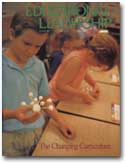On Nonstandard Standards
Ramsay Selden suggests that standards can embody the deeper criteria of quality (Letters, April 1993). Although it's a noble try, the effort is oxymoronic. A nonstandard standard is not a standard.
My point in drawing the distinction between standards and criteria is to invite those assessing student work to recognize the difference between objectives that are closed and uniform, and considerations that are open and heuristic. I applaud Selden's recognition of the need for the latter; however, by conflating standards and criteria, he obscures the meaning of each.
Let us acknowledge that we can use standards in education to assess performances whose outcomes are specifiable in advance. We need criteria to enable us to appraise the very individuality that resides at the heart of any process that calls itself educational.
—Elliot W. Eisner, Professor of Education and Art, Stanford University, Stanford, California
Rubrics Leave Children On Their Own
As a parent of a student in Christine Evans' class, I don't subscribe to the notion of “moving beyond a skill-based curriculum, which has to do with teaching, to a meaning-centered curriculum, which has to do with learning” (“When Teachers Look at Student Work,” February 1993). How can an educator think that teaching and learning are dichotomous?
In Evans' class, students determine one another's grades on portfolios. How can a student who has been given no formal training in the parameters of writing know what constitutes good writing? An example of a student's comment on a recent assignment was “save a tree.” Comments of this kind address neither the content nor the insight of the writing.
Evans states that models of rubrics have been shared with students and parents. Parents were indeed invited to one session to discuss rubrics and to evaluate students' writing. Most often the parents did not agree on which rubric to give the writing. Given this limited training and the opaque descriptions of the rubrics, most parents do not have a “clear understanding of how we look at writing.”
We do not need new lenses through which to view student work. We need teachers who will provide students with guidance to improve their writing skills.
—Steve Ron, San Diego, California
Keeping Up with Ivan
As I close out 32 years of teaching, I want to thank you for the many articles that acknowledge veteran teachers (The Professional Teacher, March 1993). I especially identified with the frustration expressed in “In Vino Veritas” by Gary Negin.
Many of us hired in the post-Sputnik era had a mandate: to devise teaching methodologies that would prepare the new generation to struggle with world communism. Those of us in the social studies worked to teach young people to think critically, evaluate the reliability of sources, avoid prejudice, and seek world understanding.
Now we are portrayed as obstructionists to restructuring. I'm left with a sad feeling. Our efforts are condemned because of the belief that “Ivan knew more than Johnny.”
—Brant Abrahamson, Riverside-Brookfield High School Riverside, Illinois
The Importance of Capability
I find many recent articles to be incredibly good, not because I agree with most of them (I don't), but because they focus on the real-life problems of our educational system. I do agree with the importance of the knowledge and capabilities of teachers in effecting school reform (Overview, “What Do you Mean 'Professional'?” Ron Brandt, March 1993). I also think Marian Matthews has stirred up something that needs to be stirred by reporting “What Gifted Students Think About Cooperative Learning” (February 1993).
My own high school teachers were awful. They hardly knew more than the text, and it wasn't until college that I realized that. So often those who advocate cooperative learning let the teacher off the hook with respect to real lesson planning and teaching. An educator's priority should be to help every student maximize capability. No educator has any business wasting the time of bright students or of neglecting slow students at the expense of the others.
—Ronald E. Mohar, Syracuse, New York
No Paeans, Please
As a former AFT member in New York State, your paean to Albert Shanker doesn't square with my recollections. Goldberg suggests that Shanker merits the mantle of statesman and moral conscience of the profession. Presidents of the National Education Association who have constitutionally limited terms have spoken more to moral issues in education in a single keynote address than Shanker has in 40 years.
—Richard J. Milner, National Education Association, Norwich, New York
Photos Depict Diversity
I really like the equal representation of males, females, and people of different racial backgrounds pictured throughout your publication. What a wonderful job of showing the diversity of people who are involved in making the educational system work.
—Jill Grundman, St. Cloud, Minnesota
